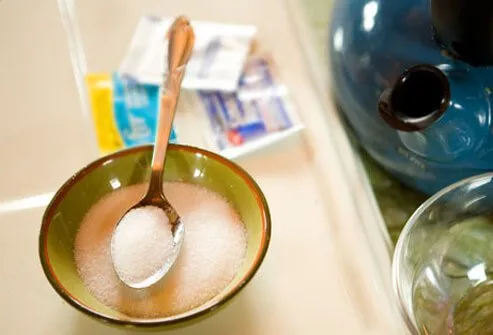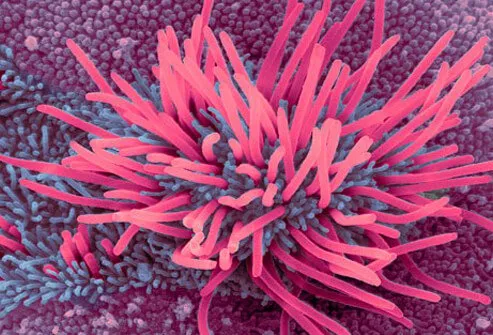How It Works

Got a stuffy nose from allergies or a cold? Nasal irrigation may help. You pour a saltwater (saline) solution into one nostril. As it flows through your nasal cavity into the other nostril, it washes out mucus and allergens.
1. Decide What You'll Use

For nasal irrigation, you'll need a container and saline solution. You can buy prefilled containers, or use a bulb syringe or neti pot. All are available at drugstores.
2. Mix the Saline Solution

If you choose a prefilled bottle, skip this step. Otherwise, you can buy a saline solution powder and follow the directions on the label or make your own. Start with 1-2 cups of warm water that's distilled, sterile, or that you've boiled to help prevent infection. Add 1/4 to 1/2 teaspoon of non-iodized salt and a pinch of baking soda.
3. Get in Position

If you're using a squeeze bottle, neti pot, or syringe, lean forward over the sink, at about a 45-degree angle. Tilt your head so that one nostril is pointed down toward the sink. Don't tilt your head back.
4. Pour in the Saline Solution

Place the spout of a neti pot or the tip of a syringe or squeeze bottle just inside your nose. The tip should go in no further than a finger's width. Keeping your mouth open, squeeze the bulb syringe or bottle, or tilt the pot to pour the water into your nostril. Remember to breathe through your mouth, not your nose.
5. Let It Drain

The saltwater will run through your nasal passages and drain out of your other nostril and maybe your mouth. You should spit it out and not swallow it. But if some does go down your throat, it won't hurt you.
6. Clear Your Nose and Repeat

Gently blow your nose to clear out the remaining solution. Repeat the procedure with your other nostril. When you're done, throw away any leftover solution and thoroughly clean the items you used. Let them air dry. Store them in a clean, dry place.
What If It Stings or Burns?

Use less salt in the saline solution. And make sure the water is lukewarm, not hot or cold.
How Fast Does It Work?

You may see results after just one or two times. The benefits grow as you continue to do it. One study showed that in the long run, nasal irrigation helped people feel in control of their sinus symptoms and improved their quality of life.
How Often Do You Use Nasal Wash?

Using a saline solution just once a day can help thin mucus, curb postnasal drip, and clean bacteria from your nasal passages. It can also wash out allergens you've inhaled. After their symptoms are gone, some people find three times a week is enough to keep them symptom-free.
Is it Right for You?

Irrigation can benefit people who have sinus problems, nasal allergies, colds, and even flu symptoms. It can help both adults and kids. Some people use it every day to stay symptom-free. You shouldn't use it, though, if you have an ear infection or a nostril that's plugged and hard to breathe through.
How Sinuses Get Clogged

It can happen if the lining of your sinuses and the passages between them become inflamed. An allergy or a cold could cause that, for instance. The inflammation swells and blocks the sinuses from draining. Bacteria can build up, leading to a sinus infection. That causes more inflammation, swelling, stuffiness, and pain.
Why Nasal Irrigation Helps

The saline solution rinses out your nasal passages. The saltwater also restores moisture and eases inflammation of the mucous membranes that line your sinuses. Tiny hair-like "cilia" in those membranes pass bacteria and other junk to the throat, where you harmlessly swallow them. With less swelling, it's easier to breathe.
Ways to Curb Allergens

With allergies, avoiding your triggers is a key way to make it easier to breathe. Use an air conditioner in your home and car during warm seasons, cut down on indoor humidity, and always run the exhaust fans when you shower or cook. Vacuum regularly, and use protective mattress and pillow covers, too.
Work With Your Doctor

One study showed that people with chronic sinus problems who used nasal irrigation were able to use fewer medications. Before you stop, talk to your doctor.
Nasal Irrigation: Natural Relief for Cold & Allergy Symptoms
This tool does not provide medical advice. See additional information: 
© 1996-2024 WebMD, LLC. All rights reserved.
Source slideshow on WebMD
